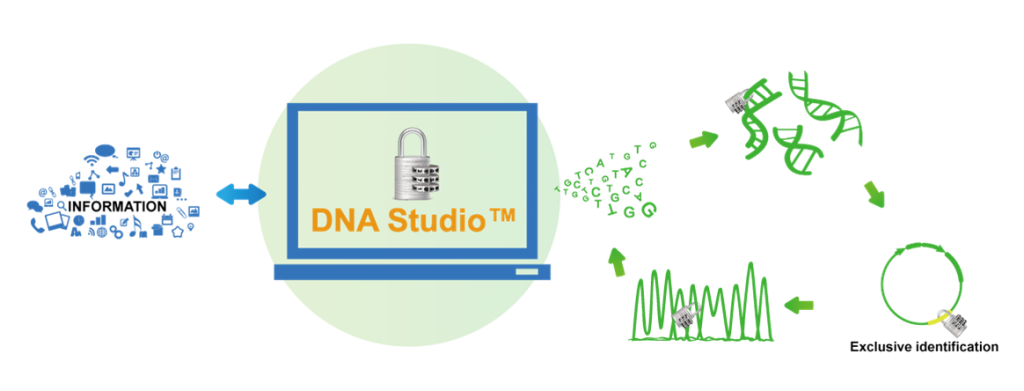General Introduction of DNA Data Storage
DNA storage technology is a groundbreaking advancement with significant future potential. It uses the four DNA bases—adenine (A), guanine (G), thymine (T), and cytosine (C)—arranged in specific sequences to encode information. This technology enables the storage of text, images, audio, and video using artificially
synthesized DNA as the medium, which can then be read back in full.
Synbio Technologies has introduced the world’s first DNA solution designed to protect our customers' proprietary information within DNA sequences. We use our patented DNA Studio to accurately synthesize a custom sequence that serves as an exclusive DNA “security code.” This unique security code can be inserted into any part of the DNA using our advanced synthesis platforms, allowing the security information to be stored as a biological “water marker”.
Highlights
-
![]()
- High Storage Density
1 mg DNA can store 2 PB data, equivalent to 3 million pieces CDs
-
![]()
- Strong Resistance
It can be preserved naturally for over a thousand years
-
![]()
- Low Maintenance
No need to maintain constantly
-
![]()
- Environmental Protection
Carbon source storage material benefits the "Green Initiative"
-
![]()
- Life Medium
Save into an organism, achieving information's "soft storage"
-
![]()
- Improvement of DNA Synthesis Technology
Service Details
Price and Turnaround Time
Please contact quote@synbio-tech.com for specific price, turnaround time and technique related issues.
Workflow
• We provide the requested DNA sequence at any position in the vector as a "security code".
• With the converting code and synthesis platforms, cryptographic sequences can be synthesized into DNA sequences.
• The "security code" can be constructed to any vector.
• The interpretation process can be easily completed through sequencing and analysis.
Deliverables
-
Design scheme
-
Synthesis chip/DNA
-
Data analysis report
Case Study
In 2017, the lab at Synbio Technologies successfully encoded the Analects of Confucius into DNA sequences using a code we developed. We synthesized it with our advanced Syno®3.0 high-throughput DNA synthesis platform. The sequences, represented by As, Ts, Cs, and Gs, were stored in DNA. Using our DNA Studio™, we achieved a 99.9% recovery rate after sequencing and decoding. This demonstrated a reliable method for hard storage in DNA.
Our R&D department has encoded the Chinese poem《沁园春•雪》(Qin Yuan Chun·Snow) into yeast. The process is aptly named “Storage-Transfer-Reading-Decoding,” a completely soft storage. This poem was reproduced 10 billion times using the fastest and the most cost-effective methods, making it the largest volume of printed works in the world.
FAQs
DNA data storage is a cutting-edge technology that uses the stability and high-density of DNA molecules to store information. It encodes digital data--such as text, images, videos, etc.--into DNA sequences and stores them within DNA molecules.
DNA data storage works by converting binary data (0s and 1s) into DNA sequences made up of its four bases (A, T, C, G.) Special algorithms encode digital information into DNA sequences, which are then synthesized into actual DNA molecules using DNA synthesis techniques. When retrieving the data, DNA sequencing technology reads the DNA sequences and converts them back into binary data, allowing for data storage and recovery.
Some applications for DNA data storage are long-term archive storage, cold data storage, and bioinformatics data storage.
Get in Touch with Us
Related Services
 DNA Synthesis
DNA Synthesis Vector Selection
Vector Selection Molecular Biology
Molecular Biology Oligo Synthesis
Oligo Synthesis RNA Synthesis
RNA Synthesis Variant Libraries
Variant Libraries Genome KO Library
Genome KO Library Oligo Pools
Oligo Pools Virus Packaging
Virus Packaging Gene Editing
Gene Editing Protein Expression
Protein Expression Antibody Services
Antibody Services Peptide Services
Peptide Services DNA Data Storage
DNA Data Storage Standard Oligo
Standard Oligo Standard Genome KO Libraries
Standard Genome KO Libraries Standard Genome Editing Plasmid
Standard Genome Editing Plasmid ProXpress
ProXpress Protein Products
Protein Products































